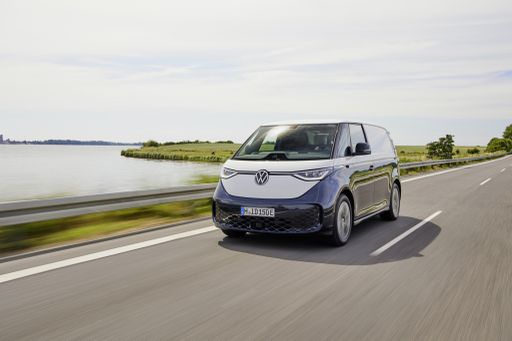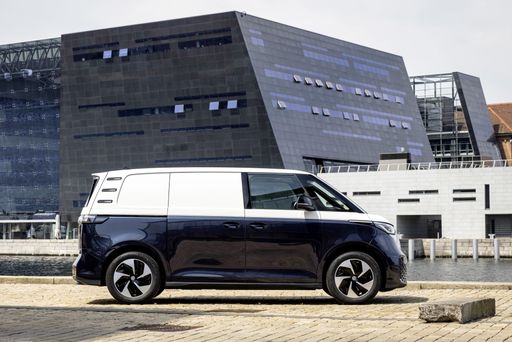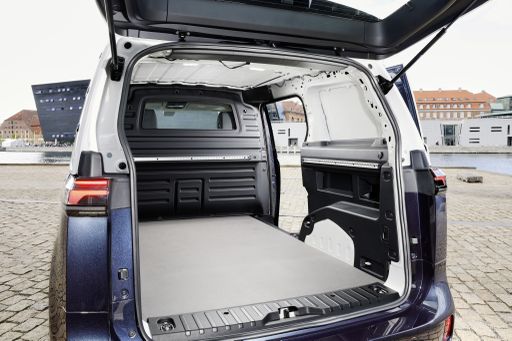Toyota Yaris VS VW ID. Buzz Cargo – Specs, Efficiency & Price Comparison
Which model is the better choice – the Toyota Yaris or the VW ID. Buzz Cargo? We compare performance (280 HP vs 340 HP), boot capacity (286 L vs ), efficiency (3.80 L vs 19.20 kWh), and of course, the price (21900 £ vs 43600 £).
Find out now which car fits your needs better!
The Toyota Yaris (Hatchback) is powered by a Full Hybrid or Petrol engine and comes with a Automatic or Manuel transmission. In comparison, the VW ID. Buzz Cargo (Cargo Van) features a Electric engine and a Automatic gearbox.
When it comes to boot capacity, the Toyota Yaris offers 286 L, while the VW ID. Buzz Cargo provides – depending on what matters most to you. If you’re looking for more power, you’ll need to decide whether the 280 HP of the Toyota Yaris or the 340 HP of the VW ID. Buzz Cargo suits your needs better.
There are also differences in efficiency: 3.80 L vs 19.20 kWh. In terms of price, the Toyota Yaris starts at 21900 £, while the VW ID. Buzz Cargo is available from 43600 £.
Compare all the key specs now and find out which model fits your lifestyle best!
Toyota Yaris
The Toyota Yaris exudes a charming blend of practicality and style, making it an appealing choice for urban drivers. Its compact design allows for easy manoeuvrability in crowded city streets, while the interior offers a surprisingly spacious and comfortable environment. With a focus on fuel efficiency and reliability, the Yaris remains a popular option for those seeking a balance between performance and economy.
details @ Toyota
@ Toyota
 @ Toyota
@ Toyota
VW ID. Buzz Cargo
The VW ID. Buzz Transporter represents a bold leap into the future with its innovative electric design and retro-inspired aesthetic. Combining practicality with modern technology, it offers a spacious interior and advanced connectivity features ideal for both urban and long-distance journeys. This vehicle stands as a testament to Volkswagen's commitment to sustainability and forward-thinking mobility solutions.
details @ volkswagen-newsroom.com
@ volkswagen-newsroom.com
 @ volkswagen-newsroom.com
@ volkswagen-newsroom.com
 @ volkswagen-newsroom.com
@ volkswagen-newsroom.com

|

|
|
|
|
Costs and Consumption |
|
|---|---|
|
Price
21900 - 45000 £
|
Price
43600 - 51400 £
|
|
Consumption L/100km
3.8 - 9.5 L
|
Consumption L/100km
-
|
|
Consumption kWh/100km
-
|
Consumption kWh/100km
19.2 - 20.3 kWh
|
|
Electric Range
-
|
Electric Range
330 - 455 km
|
|
Battery Capacity
-
|
Battery Capacity
59 - 79 kWh
|
|
co2
87 - 215 g/km
|
co2
0 g/km
|
|
Fuel tank capacity
36 - 50 L
|
Fuel tank capacity
-
|
Dimensions and Body |
|
|---|---|
|
Body Type
Hatchback
|
Body Type
Cargo Van
|
|
Seats
4 - 5
|
Seats
3
|
|
Doors
3 - 5
|
Doors
4
|
|
Curb weight
1090 - 1356 kg
|
Curb weight
2264 - 2510 kg
|
|
Trunk capacity
141 - 286 L
|
Trunk capacity
-
|
|
Length
3940 - 3995 mm
|
Length
4712 mm
|
|
Width
1745 - 1805 mm
|
Width
1985 mm
|
|
Height
1455 - 1500 mm
|
Height
1932 mm
|
|
Payload
289 - 525 kg
|
Payload
640 - 753 kg
|
Engine and Performance |
|
|---|---|
|
Engine Type
Full Hybrid, Petrol
|
Engine Type
Electric
|
|
Transmission
Automatic, Manuel
|
Transmission
Automatic
|
|
Transmission Detail
CVT, Schaltgetriebe, Automatikgetriebe
|
Transmission Detail
-
|
|
Drive Type
Front-Wheel Drive, All-Wheel Drive
|
Drive Type
Rear-Wheel Drive, All-Wheel Drive
|
|
Power HP
116 - 280 HP
|
Power HP
170 - 340 HP
|
|
Acceleration 0-100km/h
5.5 - 9.7 s
|
Acceleration 0-100km/h
-
|
|
Max Speed
175 - 230 km/h
|
Max Speed
145 - 160 km/h
|
|
Torque
390 Nm
|
Torque
310 - 679 Nm
|
|
Number of Cylinders
3
|
Number of Cylinders
-
|
|
Power kW
85 - 206 kW
|
Power kW
125 - 250 kW
|
|
Engine capacity
1490 - 1618 cm3
|
Engine capacity
-
|
General |
|
|---|---|
|
Model Year
2024 - 2025
|
Model Year
2024
|
|
CO2 Efficiency Class
B, G
|
CO2 Efficiency Class
A
|
|
Brand
Toyota
|
Brand
VW
|
Toyota Yaris
Introducing the Next-Gen Toyota Yaris: A Blend of Innovation and Technology
The Toyota Yaris has long been lauded for its efficiency, reliability, and practicality. As we venture into the 2024 model year, Toyota has upped the ante with the latest versions of this popular hatchback, melding cutting-edge technology with eco-conscious design. Here’s an in-depth look at what makes the current Yaris line-up stand out from the crowd.
Efficient Powertrains: Hybrid and Beyond
Spearheading the technological innovation in the Yaris range is the introduction of various hybrid models. The Yaris offers a 1.5-litre full-hybrid engine, marrying a petrol engine with an electric motor to produce between 116 and 130 PS. This power blend is controlled via a sophisticated CVT-gearbox, optimizing both performance and fuel efficiency, with consumption figures ranging from an impressive 3.8 to 4.2 litres per 100 km.
For those seeking pure performance, the GR Yaris variants provide a turbocharged 1.6-litre engine capable of producing 280 PS. This power is delivered via a choice of manual or automatic transmission, giving drivers the tactile involvement or convenience they desire.
Design that Fulfils and Inspires
The Yaris hasn't forgotten its roots as a compact, city-friendly hatchback, measuring between 3,940 and 3,995 mm in length. With its bold front grille, sleek lines, and a choice of striking colours, it's a car that turns heads while remaining perfectly suited for urban environments.
The interior is equally impressive, designed with a focus on driver convenience and comfort. Depending on the variant, Yaris can offer generous cargo space of up to 286 litres, making it a perfect companion for everyday tasks or weekend escapes.
Technological Integration: The Smart Choice
Toyota's approach goes beyond just improving engine technology; the Yaris is packed with innovative features aimed at enhancing the driving experience. It boasts a suite of advanced safety systems such as lane departure alert, pre-collision system, and adaptive cruise control, ensuring peace of mind on the road.
The infotainment system in the Yaris is designed to keep you connected, offering seamless smartphone integration, a user-friendly interface, and an intuitive navigation system, ensuring that you're always informed and entertained.
The Cost of Innovation
Owning a Yaris is not just about impressive technology; it's also about making economic sense. With a price range between €25,500 and €49,990, and monthly costs spanning from €748 to €1,513, it offers a broad spectrum to suit different budget needs.
Concerned about emissions? You can rest easy knowing that the Yaris boasts a CO2 efficiency class ranging from B to G, thanks to its low emissions output of between 87 to 215 g/km.
Conclusion: The Toyota Yaris Drives the Future
The Toyota Yaris continues to be a strong contender in the compact car segment, pushing boundaries with its innovative full-hybrid systems and performance-oriented GR models. It's a remarkable blend of design, technology, and economy, ensuring it remains a top choice for drivers who demand more from their hatchbacks.
Whether you're seeking the efficiency of a hybrid or the thrill of the GR Yaris, there's a model tailored to your unique driving needs in Toyota's latest Yaris lineup.
VW ID. Buzz Cargo
Reimagining the Classic: The VW ID. Buzz Transporter
The automotive industry has recently been inundated with a range of electric vehicles (EVs), but few can claim a lineage as iconic as the Volkswagen ID. Buzz Cargo. A modern-day reimagining of the classic VW Microbus, the ID. Buzz Transporter seamlessly blends nostalgia with cutting-edge technology and sustainable performance.
Power Meets Precision: Performance and Efficiency
Available in multiple configurations, the ID. Buzz Transporter offers both rear-wheel drive and all-wheel drive options. The base model features an impressive 286 horsepower and a respectable electric range of 461 km, thanks to its 19.2 kWh consumption per 100 km. For those who crave more power, the all-wheel-drive model ups the ante with a thrilling 340 horsepower and a range of 432 km, facilitated by its slightly higher 20.3 kWh/100 km consumption.
Both versions rely on an efficient reduction gearbox, ensuring a smooth and automatic driving experience. The rear-wheel-drive's entry-level model provides a more accessible point for EV enthusiasts with 170 horsepower and an overall easier handling package.
The Heart of an Electric Revolution: Battery and Range
Power comes from robust battery configurations that reflect VW's commitment to sustainable performance. The ID. Buzz Transporter boasts a 79 kWh battery in its higher-end models, allowing expansive commutes or work-related travels. Meanwhile, the 59 kWh option offers a reduced footprint, without substantially compromising on performance, to align perfectly with its more entry-level 170 HP variant.
Functional Innovation: Design and Practicality
While the exterior design pays homage to its retro predecessor, the four-door ID. Buzz is all about embracing modern interior design. The cargo van accommodates up to three seats, making it not only a style statement but a practical choice for businesses needing a workhorse with a zero-emission output.
Weighing in at a curb weight range from 2264 kg to 2510 kg, depending on the model chosen, the vehicle is a testament to Volkswagen's focus on durability and reliability. Despite its weight, the ID. Buzz delivers a payload ranging from 640 kg to 753 kg, maintaining crucial cargo efficiency.
Sustainability Meets Technology: Features and Future Outlook
Volkswagen intentionally integrated forward-thinking technology into the ID. Buzz, emphasizing zero emissions with a CO2 rating of 0 g/km and maintaining an A-grade CO2 efficiency class. These advancements, paired with a maximum speed of 160 km/h and an impressive torque (ranging from 310 Nm to 679 Nm based on the selected variant), set a new standard for electric utility vehicles.
Conclusion: A Symbol of Tomorrow, Today
The ID. Buzz Transporter signifies VW's earnest step into the future while paying homage to its rich heritage. Priced between €50,825 and €59,922, the vehicle caters to a range of consumers looking for a versatile and eco-friendly solution without sacrificing quality or style. With its innovative engineering and nostalgic charm, the ID. Buzz Transporter is poised to capture the imagination of both traditional VW fans and new EV adopters in 2024.
The prices and data displayed are estimates based on German list prices and may vary by country. This information is not legally binding.
